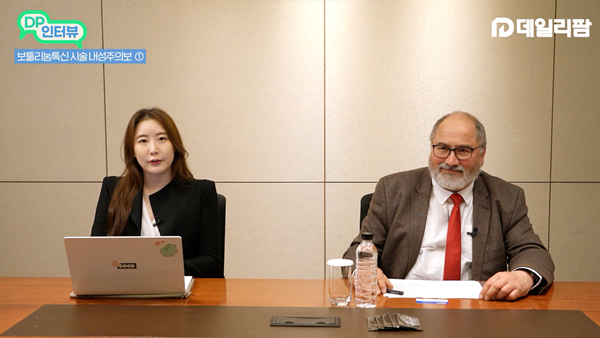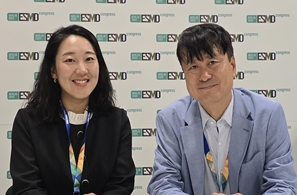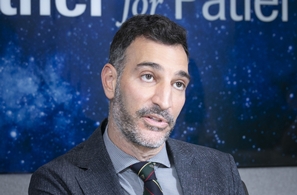- ‘Botulinum resistance lasts for at least 4 years’
- by Jung, Sae-Im | translator Kim, Jung-Ju | Jun 21, 2023 05:52am

Reporter Sae-Im Jung (Reporter Jung): Some say that 'unnecessary proteins can increase immunogenicity, but they do not lead to the formation of neutralizing antibodies.’ Can we say that this opinion lack grounds based on actual clinical data?
Dr. Michael Martin: Well, it is not only weak, but it is also wrong. Because we have clear publications. I can name your three independent clinical publications that document quite clearly that there are no neutralizing antibodies, no immune-resistance if you treat your patients exclusively with a pure botulinum toxin. And in the same studies, other patients were treated with other preparations that contain complexing proteins, and they develop neutralizing antibodies, depending on the concentration, the dose up to 13, 14%.
These are therapeutic patients with neurological disorders. So, this is very high. It's not that high in aesthetics yet.
But as I said, the doses that are used in aesthetics in the APAC region is easily now comparable to the dose that neurologists used in these clinical studies. So, claiming that immunogenicity has nothing to do...I don't understand the arguments.
You know immunogenicity tells whether the immune system makes antibodies or not. And if you accept that there is the risk of immunogenicity, and you link it to the presence of impurities, then it's quite clear that more impurities mean more antibody, and less impurities mean less antibodies. It's quite simple.
Reporter Jung: . In fact, more types of botulinum toxin products are offered in Korea than in other countries. When choosing for aesthetic purposes, we also look at the brand, but sometimes our choices can change depending on the price or promotions. Are there things we should pay attention to when choosing a botulinum toxin?
Dr. Martin: Of course, you're absolutely correct. I think Korea is the country in the world with the most products available on the market, especially for aesthetics. So, you're very active. And many of these products are in fact Korean products.
So, I know, in the world, 3 products including Xeomin at the moment available, that contain only the pure toxin. But they differ; they differ in how they are produced, and which type of excipients are in there, how they are prepared. So, they're not the same, although they are all 3 pure.
But what should a patient a lay-person consider? I think we have to make the physician, the person who's treating this adult person…... aesthetics is always adult person grown up persons, never children. And it's always an elective treatment, you want to be treated, because you want to be more beautiful, you want to feel more satisfied with yourself. But it's not like a neurology, where you have a severe disorder that relieves your life quality. You know, it's different.
So, it's an adult person that chooses to be treated with botulinum neurotoxin. And I think it's very difficult for the layperson, alone, to make this decision. She or he needs help. And I think the person who injects, the physician or the healthcare professional, is really the person that should inform the patient of possible risks, possible implications, if treated with a not-so-pure – let me say not-so-pure – maybe, cheaper product, right? Because that, of course goes hand in hand.
Because producing a high-quality product does not only mean that you will get rid of the dirt, but you have to get rid of the dirt of the bacterial impurities in a clearly documented process, under so-called GMP production, good manufacturing procedures. This is controlled by authorities. In Korea, you have an authority, Korean FDA, like in United States, like in Europe.
So, it's not surprising that very well purified and well characterized products are a little bit more expensive than some that may have not undergone such a stringent and reliable process. So yes, they may be cheaper products. I agree. But I think safety and security also has a price. But the patient needs to be informed by the person that injects.
I think this is mandatory. And therefore, it's mandatory that the person who injects herself or himself is aware of the problem, and accepts that there are risks if one injects an impure neurotoxin preparation, be it from Korea or some other place that has nothing to do with the country where it's used or where it's produced. It's clearly international problem.
I think the person that decides to have an aesthetic treatment with botulinum neurotoxin, must be aware that it is a medical treatment. It's not like a massage. It's not like putting a cream on the face that you can remove immediately. You are being injected with a pharmaceutical. It's a medical treatment. It's no fun, and medical treatment comes with risks. We accept that medical treatment comes with risks.
And I think people have to know these risks. And they have to be aware of possible consequences for their future life, especially when you consider that people are younger and younger, now.
They are treated, for example, for aesthetic purposes with let's say, an impure petroleum toxin, and they are developing resistance. This resistance lasts for a long period of time. There are studies that claim you have to wait years, 4 to 6 years before they decline. That's a long time. In that time, this person may have a disorder that would require therapeutic use of botulinum neurotoxin; neurological disorder.
There are many, many indications nowadays for botulinum neurotoxin. But you cannot treat this person with botulinum neurotoxin in that period, as long as the neutralizing antibodies are high. And this is very important, that somebody who decides to be treated is made aware of these risks.
And I think if you know what could happen, you may also be more willing to pay a little bit more for quality. And a little bit more for safety. Documented safety.
Reporter Jung: What if a patient already has used products that contain many complexing proteins and have developed a resistance to them? What should these patients do?
Dr. Martin: Maybe one point to this…... In aesthetics, it's a little bit different than therapeutics. Because patients that go for botulinum neurotoxin treatment for neurological disorders, they go to hospital. And they're very well documented. And they don't tend to change their doctors. They stick to their clinic, to that hospital to the neurological unit, where they are being successfully treated. So even if they develop antibodies, they will stick to that doctor.
In aesthetics, it's a little bit different. Because, of course, people can say, oh, it does not work as good as it worked before. The doctor‘s doing something wrong, he or she is injecting wrong, the material is not so good, maybe I get better results, and they have to pay for it. Maybe I get better results if I go somewhere else, and have another brand with more dose. So, it's a bit different in therapeutics and aesthetics.
And therefore, I think it is absolutely necessary to make the people who use the toxin for aesthetic purposes, to make them aware that it's not a good idea to hop from one doctor, from one brand to the other. Because that can increase immunogenicity and not reduce it.
And if they do that, they're completely free in that decision, of course, where they go and what they want as treatment, they should tell the new physician that they had an injection or more injections with a certain brand before so that they can judge what to do. Is it riskier now to change the brand, is it riskier to increase the dose in terms of immunogenicity? But it's always the patient together with the physician. And they have to be made aware of the problem. I don't think it's fair to live leave it all up to the consumer, to the one that is being treated.
It is the duty of the physician to inform the future patient of what she or he can expect for the money he or she pays, and what the risks are, and what options there may be, that may be a bit more expensive, but maybe less riskier. And I think you should not underestimate the role you, the press, can play in informing the end-user. Maybe the companies are not so interested, but you can force the end-user to seek for information, and you can force the companies to provide information. And I think this is very important. And you can participate in this.
Reporter Jung: Yes. I will do my part to provide more accurate information in the future. Thank you for the interview.
Dr. Martin: It was my pleasure. Thank you very much.
-

- 0
댓글 운영방식은
댓글은 실명게재와 익명게재 방식이 있으며, 실명은 이름과 아이디가 노출됩니다. 익명은 필명으로 등록 가능하며, 대댓글은 익명으로 등록 가능합니다.
댓글 노출방식은
댓글 명예자문위원(팜-코니언-필기모양 아이콘)으로 위촉된 데일리팜 회원의 댓글은 ‘게시판형 보기’와 ’펼쳐보기형’ 리스트에서 항상 최상단에 노출됩니다. 새로운 댓글을 올리는 일반회원은 ‘게시판형’과 ‘펼쳐보기형’ 모두 팜코니언 회원이 쓴 댓글의 하단에 실시간 노출됩니다.
댓글의 삭제 기준은
다음의 경우 사전 통보없이 삭제하고 아이디 이용정지 또는 영구 가입제한이 될 수도 있습니다.
-
저작권·인격권 등 타인의 권리를 침해하는 경우
상용 프로그램의 등록과 게재, 배포를 안내하는 게시물
타인 또는 제3자의 저작권 및 기타 권리를 침해한 내용을 담은 게시물
-
근거 없는 비방·명예를 훼손하는 게시물
특정 이용자 및 개인에 대한 인신 공격적인 내용의 글 및 직접적인 욕설이 사용된 경우
특정 지역 및 종교간의 감정대립을 조장하는 내용
사실 확인이 안된 소문을 유포 시키는 경우
욕설과 비어, 속어를 담은 내용
정당법 및 공직선거법, 관계 법령에 저촉되는 경우(선관위 요청 시 즉시 삭제)
특정 지역이나 단체를 비하하는 경우
특정인의 명예를 훼손하여 해당인이 삭제를 요청하는 경우
특정인의 개인정보(주민등록번호, 전화, 상세주소 등)를 무단으로 게시하는 경우
타인의 ID 혹은 닉네임을 도용하는 경우
-
게시판 특성상 제한되는 내용
서비스 주제와 맞지 않는 내용의 글을 게재한 경우
동일 내용의 연속 게재 및 여러 기사에 중복 게재한 경우
부분적으로 변경하여 반복 게재하는 경우도 포함
제목과 관련 없는 내용의 게시물, 제목과 본문이 무관한 경우
돈벌기 및 직·간접 상업적 목적의 내용이 포함된 게시물
게시물 읽기 유도 등을 위해 내용과 무관한 제목을 사용한 경우
-
수사기관 등의 공식적인 요청이 있는 경우
-
기타사항
각 서비스의 필요성에 따라 미리 공지한 경우
기타 법률에 저촉되는 정보 게재를 목적으로 할 경우
기타 원만한 운영을 위해 운영자가 필요하다고 판단되는 내용
-
사실 관계 확인 후 삭제
저작권자로부터 허락받지 않은 내용을 무단 게재, 복제, 배포하는 경우
타인의 초상권을 침해하거나 개인정보를 유출하는 경우
당사에 제공한 이용자의 정보가 허위인 경우 (타인의 ID, 비밀번호 도용 등)
※이상의 내용중 일부 사항에 적용될 경우 이용약관 및 관련 법률에 의해 제재를 받으실 수도 있으며, 민·형사상 처벌을 받을 수도 있습니다.
※위에 명시되지 않은 내용이더라도 불법적인 내용으로 판단되거나 데일리팜 서비스에 바람직하지 않다고 판단되는 경우는 선 조치 이후 본 관리 기준을 수정 공시하겠습니다.
※기타 문의 사항은 데일리팜 운영자에게 연락주십시오. 메일 주소는 dailypharm@dailypharm.com입니다.
- [Reporter's View] Transparent info, the key to vaccine trust
- Reporter's view | Son, Hyung Min









